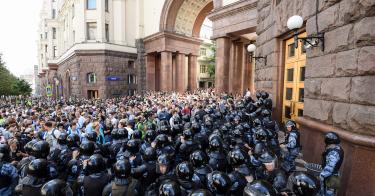Some surprising events transpired in Moscow last weekend. Violent protests—the largest in Russia in a decade—erupted, and more than 1,300 people were detained.
Protesters demanded that dissident figures be allowed to run in the local city council elections set for Sept. 8. Authorities declared the protests illegal, but thousands of people showed up anyway, chanting everything from “Where is my signature?” and “Where is my candidate?” to “Fair elections now!” and “Russia will be free!”
The demonstrations turned violent. Protesters attempted to remove fences and barriers installed by police, riot police sprayed protesters with a chemical irritant, and protesters and policemen got in scuffles that in some cases resulted in protesters’ head injuries.
Policemen also beat and detained several opposition activists and politicians, such as Ivan Zhdanov, Ilya Yashin, Valery Rodin, Lyubov Sobol, and Dmitry Gudkov. Authorities have begun sentencing some of these figures to up to two weeks in jail.
The day following the protests, Alexei Navalny was transferred from jail to a hospital because of an “acute allergic reaction,” according to his spokeswoman. His face became severely swollen, and he developed a rash, which has aroused skepticism because Navalny never before had experienced an allergic reaction, as he states on his website. Because of this, some suspect that he may have been poisoned by an unidentified chemical agent.
Russia has a history of poisoning opposition figures.
In 2006, Putin critic Alexander Litvinenko was poisoned by polonium-laced tea, and in 2018, former Russian double-agent Sergei Skripal and his daughter, Yulia, were poisoned by touching Novichok, a Soviet-era nerve agent. Over the years, Russia has poisoned multiple others for what it deemed disloyalty to the state.
On July 29, Navalny was released from the hospital, having undergone intense steroidal treatment. He then was returned to prison.
For the September city council elections in Moscow, much is at stake. The council, controlled by the pro-Kremlin United Russia party, is responsible for “a large municipal budget” and has only 45 seats.
Election officials so far have registered almost 200 candidates for the election, but most of them align with Russian President Vladimir Putin. Opposition candidates say they have filed and met the conditions to be placed on the ballot, but their names do not appear. This’s what spurred on the protests of last weekend.
Democracy and free and fair elections are uncommon in Putin’s Russia. When protests occur, crackdowns usually follow, and opposition figures are imprisoned. For example, Navalny has been imprisoned more than 10 timesand spent hundreds of days in custody over the past eight years.
Putin’s control over everything makes life difficult for the Russian people. The economy has turned south of late, which has hurt Putin’s approval ratings over the last year.
The Russian Constitution declares in its very first article that Russia is a democratic state, but Putin has no fear poll numbers will hurt him because it is not, in fact, a democracy.
The Russian people deserve much better, but as long as Putin has no real accountability, positive change will not occur.
This piece originally appeared in The Daily Signal



